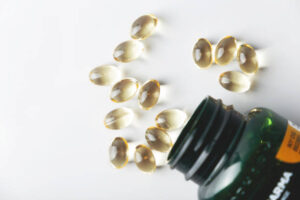Have you ever pondered the potential of Vitamin E for the skin? Undoubtedly, this little powerhouse plays a starring role in nourishing, revitalizing, and bringing out the best in your skin. Join us on this journey as we unravel the mysteries surrounding Vitamin E, unlocking the door to skin that is not only healthier but exudes vibrant radiance.

What does vitamin E do for your skin?
Is vitamin E good for your skin? Certainly, Vitamin E oil is incredibly advantageous for the skin. Scroll down to see evidence of the benefits of vitamin E oil.
Antioxidant Properties
Vitamin E, like vitamin C, emerges as a powerful protector, diligently neutralizing free radicals and preventing oxidative damage to your skin caused by free radicals. It captures energy from ultraviolet rays and protects your skin cells. By effectively fighting these threats, Vitamin E plays an important role in preserving skin elasticity and promoting overall skin health

Moisturizing Effect
Vitamin E, a fat-soluble vitamin, is a remarkable skin nourisher, renowned for its ability to moisturize and revitalize the skin. Its emollient properties help to lock in moisture, preventing dryness and promoting a soft, supple complexion. As a powerful antioxidant, vitamin E combats free radical damage, which can contribute to skin dehydration and premature aging.
Skin Repair and Healing
Vitamin E has the ability to reduce inflammation and contribute to wound healing. In 2023, a study published in the journal Wound Repair and Regeneration investigated the effectiveness of vitamin E in promoting skin repair following laser resurfacing. It revealed that the topical application of vitamin E markedly expedited wound healing and enhanced skin texture in comparison to the control group.

UV Radiation Protection
Vitamin E acts as a UV absorber, directly absorbing UV radiation and reducing its penetration into the skin. Many studies have shown that the topical application of vitamin E can help prevent sun-induced skin damage, including sunburn and premature aging. While vitamin E cannot completely replace sunscreen, it can be a valuable addition to a sun protection routine, providing an extra layer of defense against the damaging effects of UV radiation.
Anti-Inflammatory Properties
Vitamin E, with anti-inflammatory properties, is a valuable ally in calming irritated or inflamed skin conditions. It plays a role in reducing inflammation, easing symptoms like redness, itching, and swelling. These anti-inflammatory properties can be particularly advantageous for individuals with skin conditions such as eczema, psoriasis, and acne. In eczema, vitamin E aids in alleviating itching and inflammation, while in psoriasis, it may contribute to reducing redness and scaling. For acne, vitamin E can assist in minimizing inflammation and supporting the healing process.
Improvement of Skin Texture
Vitamin E plays a vital role in collagen synthesis, a process essential for maintaining the skin’s youthful appearance. Collagen provides the skin’s scaffolding, supporting its structure and preventing sagging. Vitamin E’s ability to stimulate collagen production helps maintain skin elasticity, aids in enhancing skin pigmentation.
In 2023, a research paper published in the journal Skin Pharmacology and Physiology delved into the impact of applying topical vitamin E on skin hydration and elasticity. The findings revealed a substantial enhancement in skin hydration and elasticity with the topical use of vitamin E, indicating its potential to enhance the overall appearance and texture of the skin.
Preventing or treating fine lines and wrinkles
one study found that individuals who took vitamin E supplements for six months had fewer wrinkles than those who did not take the supplements. Nevertheless, more research is needed to confirm the effectiveness of vitamin E in preventing fine lines and wrinkles. If you are considering using vitamin E to treat fine lines and wrinkles, it is important to talk to your doctor first. They can help you determine if vitamin E is right for you and provide advice on the best way to use it.
Versatility in Skincare Routine
Demonstrating its efficacy in skincare regimens, Vitamin E stands out as an active ingredient with diverse applications. Whether applied independently or as a complement to other formulations, Vitamin E contributes to skin protection and nourishment. In cleansing products, it serves as a mild solution, effectively eliminating makeup, skin debris, and oil without causing pore congestion. Simultaneously, it alleviates and soothes irritated skin. In serum form, Vitamin E assumes the role of a potent antioxidant, safeguarding the skin against free radical damage, and elevating the overall complexion.

Skin cancer prevention
Vitamin E has been studied for its potential to prevent skin cancer. Some studies have shown that it may help to protect against skin damage caused by ultraviolet (UV) radiation, which is a major risk factor for skin cancer.. By neutralizing free radicals – unstable molecules capable of cell damage, Vitamin E preserves the integrity of skin cells, thereby diminishing the likelihood of mutations that may pave the way for skin cancer.
Effective in treating scars
While opinions on the efficacy of vitamin E in diminishing scars vary, it’s crucial to acknowledge that numerous studies indicate well-moisturized skin is less susceptible to scarring. The use of a scar treatment cream can be more effective when applied to adequately moisturized skin. Therefore, for individuals without an allergic reaction to vitamin E, incorporating it as a moisturizer during the healing process may offer certain advantages.

How to use vitamin E oil on face
Begin by giving your face a refreshing cleanse to create a clean canvas. Gently pat your skin dry with a soft towel. Then, using either a clean fingertip or a cotton swab, apply a small amount of vitamin E oil to your face. You should pay extra attention to areas that tend to get dry or show signs of aging. Treat your skin to a relaxing massage with circular motions, allowing the oil to be absorbed.
For the best results, incorporate vitamin E oil into your nightly skincare routine to give your skin the nourishment it truly deserves. Keep in mind that a little goes a long way, so start with a small amount and adjust based on how your skin responds. Embrace the soothing and rejuvenating qualities of vitamin E oil for a radiant and healthy complexion. Your skin will thank you!
Risks and Considerations of Vitamin E Supplementation
Experts emphasize caution and careful consideration when it comes to using vitamin E, particularly in skincare. The effectiveness of vitamin E in skincare requires further substantiation through additional research.
The use of vitamin E has the possibility of interacting with different health conditions.. Notably, some studies indicate that the oral consumption of vitamin E could potentially elevate the risk of prostate cancer. Additionally, other research suggests a potential increased risk of mortality in individuals with a significant history of heart disease, such as a prior heart attack or stroke, who use vitamin E. It is crucial to be aware of these potential interactions and consult with a healthcare professional before incorporating vitamin E into your regimen.
FAQ
1. Is it okay to use vitamin E oil every day?
It is generally safe to use vitamin E oil on your skin every day, but it is important to talk to your doctor first to make sure it is right for you.
2. When should you apply vitamin E oil to your skin?
Vitamin E oil pairs well with vitamin C in your skincare routine. It’s advised to apply vitamin E oil as the final step, given its heavier consistency compared to certain moisturizers.
3. What are the benefits of vitamin E for hair?
Vitamin E may contribute to a healthy scalp and hair by leveraging its natural antioxidant effects, potentially aiding in the maintenance of hair growth. Its antioxidant properties have the potential to diminish oxidative stress and counteract free radicals, which can otherwise lead to the breakdown of hair follicle cells in the scalp.
4. Does vitamin E help skin look younger?
Consuming vitamin E-rich products provides a safeguard against skin aging by diminishing collagen cross-linking and cellular-level lipid peroxidation. Moreover, vitamin E serves as a protective shield against sun-induced skin damage, fortifying the skin’s resilience to the effects of ultraviolet (UV) light, thereby reducing wear and tear.
5. How often should you use vitamin E on your face?
Feel free to incorporate skincare products with vitamin E into your nightly routine. However, if you’re using pure vitamin E oil, it’s best to apply it once or twice a week at most. This is because pure vitamin E oil is fat-soluble and can accumulate in the pores..
Conclusion
Applying Vitamin E oil for the skin can contribute to a nourished and healthy complexion, thanks to its recognized moisturizing and antioxidant properties. If you’re looking for a natural way to enhance your skin’s health and vitality, consider incorporating vitamin E oil into your skincare routine. Many individuals have experienced positive results, with skin appearing smoother, firmer, and more luminous.
Have you tried using vitamin E oil? Share your experiences in the comments section below.







